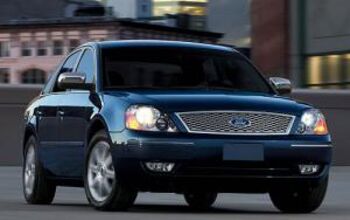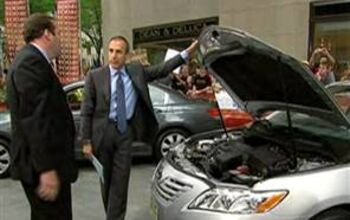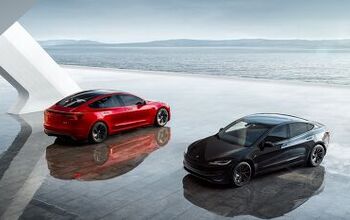Ask The Best And Brightest: Is It Time For A Movie About The Auto Industry?
Over at CNN Money, Alex Taylor III makes an astute observation about Bill Vlasic’s new book “Once Upon A Car,”
When Hollywood has tried capturing the auto industry on film, it aimed at realistic drama but wound up with suds… What filmmakers have lacked is believable characters and realistic dialogue. Until now, that is, thanks to a new book, Once upon a Car, by veteran Detroit newspaperman Bill Vlasic. Vlasic knows the industry in and out and enjoys near-universal access to its key figures. He recounts a tale filled with shrewd insights into their characters and conflicts told through verbatim accounts of their conversations. It’s the first nonfiction auto book that reads like a screenplay.
This, in a nutshell, is what I found so appealing about Vlasic’s book: it avoids the temptation to turn Detroit’s drama into a morality play, allowing the story to unfold in a personal, organic fashion. In my review of the book, to be published shortly by The Wall Street Journal, I argue that Vlasic’s approach holds a valuable lesson for automotive journalists of all stripes. Taylor, on the other hand, thinks Vlasic’s story is the perfect basis for a movie, and even goes so far as to make some casting suggestions (Al Pacino as Sergio Marchionne, Tom Hanks as Bill Ford, Tom Cruise as Alan Mulally, Sean Connery as Bob Lutz, Tom Wilkinson as Rick Wagoner). We already know there’s an auto industry video game simulation in the works, so I wonder, does the drama of the past few years make the auto industry a worthy subject for a great movie? At least worthier than, say, “ The Prince Of Motor City“? If so, would you rather see a historically accurate film based directly on sources like Vlasic’s book, a fictionalized account with real-life characters, or a fictionalized film-à-clef interpretation? Also, wouldn’t Kyle McLaughlin make the better Rick Wagoner? Discuss…
More by Edward Niedermeyer
Latest Car Reviews
Read moreLatest Product Reviews
Read moreRecent Comments
- W Conrad I'm not afraid of them, but they aren't needed for everyone or everywhere. Long haul and highway driving sure, but in the city, nope.
- Jalop1991 In a manner similar to PHEV being the correct answer, I declare RPVs to be the correct answer here.We're doing it with certain aircraft; why not with cars on the ground, using hardware and tools like Telsa's "FSD" or GM's "SuperCruise" as the base?Take the local Uber driver out of the car, and put him in a professional centralized environment from where he drives me around. The system and the individual car can have awareness as well as gates, but he's responsible for the driving.Put the tech into my car, and let me buy it as needed. I need someone else to drive me home; hit the button and voila, I've hired a driver for the moment. I don't want to drive 11 hours to my vacation spot; hire the remote pilot for that. When I get there, I have my car and he's still at his normal location, piloting cars for other people.The system would allow for driver rest period, like what's required for truckers, so I might end up with multiple people driving me to the coast. I don't care. And they don't have to be physically with me, therefore they can be way cheaper.Charge taxi-type per-mile rates. For long drives, offer per-trip rates. Offer subscriptions, including miles/hours. Whatever.(And for grins, dress the remote pilots all as Johnnie.)Start this out with big rigs. Take the trucker away from the long haul driving, and let him be there for emergencies and the short haul parts of the trip.And in a manner similar to PHEVs being discredited, I fully expect to be razzed for this brilliant idea (not unlike how Alan Kay wasn't recognized until many many years later for his Dynabook vision).
- B-BodyBuick84 Not afraid of AV's as I highly doubt they will ever be %100 viable for our roads. Stop-and-go downtown city or rush hour highway traffic? I can see that, but otherwise there's simply too many variables. Bad weather conditions, faded road lines or markings, reflective surfaces with glare, etc. There's also the issue of cultural norms. About a decade ago there was actually an online test called 'The Morality Machine' one could do online where you were in control of an AV and choose what action to take when a crash was inevitable. I think something like 2.5 million people across the world participated? For example, do you hit and most likely kill the elderly couple strolling across the crosswalk or crash the vehicle into a cement barrier and almost certainly cause the death of the vehicle occupants? What if it's a parent and child? In N. America 98% of people choose to hit the elderly couple and save themselves while in Asia, the exact opposite happened where 98% choose to hit the parent and child. Why? Cultural differences. Asia puts a lot of emphasis on respecting their elderly while N. America has a culture of 'save/ protect the children'. Are these AV's going to respect that culture? Is a VW Jetta or Buick Envision AV going to have different programming depending on whether it's sold in Canada or Taiwan? how's that going to effect legislation and legal battles when a crash inevitibly does happen? These are the true barriers to mass AV adoption, and in the 10 years since that test came out, there has been zero answers or progress on this matter. So no, I'm not afraid of AV's simply because with the exception of a few specific situations, most avenues are going to prove to be a dead-end for automakers.
- Mike Bradley Autonomous cars were developed in Silicon Valley. For new products there, the standard business plan is to put a barely-functioning product on the market right away and wait for the early-adopter customers to find the flaws. That's exactly what's happened. Detroit's plan is pretty much the opposite, but Detroit isn't developing this product. That's why dealers, for instance, haven't been trained in the cars.
- Dartman https://apnews.com/article/artificial-intelligence-fighter-jets-air-force-6a1100c96a73ca9b7f41cbd6a2753fdaAutonomous/Ai is here now. The question is implementation and acceptance.

































Comments
Join the conversation
Gung ho? Loved that film
Another great picture, apparently not available to buy & rarely shown on TCM: "An American Romance". An immigrant designs a safer car like Tucker, gets disillusioned by the major brands & sets himself up in business. If you ever get the chance worth watching.